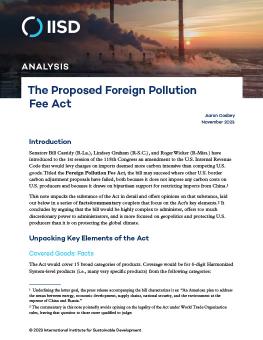
The Proposed Foreign Pollution Fee Act
The recent amendment to the U.S. Internal Revenue Code, the Foreign Pollution Fee Act, proposes charges on carbon-intensive imports. This analysis delves into the bill's details, expressing concerns about its complexity, excessive discretionary power, and a perceived emphasis on geopolitics over global climate protection.
-
Aaron Cosbey analyzes the proposed #ForeignPollution Fee Act, emphasizing its challenges in administration, the excessive discretionary powers, and its focus on geopolitical interests over global climate protection.
-
U.S. legislators aim to align #TradePolicy with climate goals through the Foreign Pollution Fee Act. However, @AaronCosbey's analysis highlights complexities, excessive discretion, and geopolitical priorities that could hinder its effectiveness in addressing global #climatechange.
-
With a focus on protecting U.S. producers, does the Foreign Pollution Fee Act truly prevent carbon leakage, or could it inadvertently hinder global efforts to mitigate climate change? @AaronCosbey unpacks the key elements of the Act.
In the realm of U.S. legislative initiatives addressing climate change and trade policy, Senators Bill Cassidy (R-La.), Lindsey Graham (R-S.C.), and Roger Wicker (R-Miss.) have introduced the Foreign Pollution Fee Act. This legislative proposal aims to levy charges on imports with higher carbon intensity than their U.S. counterparts. The bill has garnered attention for its potential to succeed where other border carbon adjustment proposals have faltered. However, this analysis reveals complex administrative challenges, broad discretionary powers, and a focus on geopolitical positioning and protecting domestic industries over global climate mitigation.
Participating experts
You might also be interested in
November 2024 | Carbon Minefields Oil and Gas Exploration Monitor
In October 2024, 20 oil and gas exploration licences were awarded across three countries, with a significant portion granted by Brazil.
Unlocking Supply Chains for Localizing Electric Vehicle Battery Production in India
This study aims to highlight the key supply chain barriers in localizing electric vehicle (EV) battery cell manufacturing in India. It summarizes consultations with 12 companies, as well as experts and policy-makers, to determine the crucial challenges and opportunities in localizing battery manufacturing in India.
The WTO and Fisheries Subsidies: Where are we, exactly?
What are the latest developments in WTO fisheries subsidies negotiations, focusing on marine conservation, community impact, and sustainable fishing practices? Tristan Irschlinger offers a comprehensive overview explaining key aspects of the agreement, ongoing discussions, and what’s at stake for global fishery sustainability.
Adding Fuel to the Fire: How export restrictions can exacerbate climate change’s impacts on global food security
Higher temperatures will likely reduce agricultural yields and production in most countries, raising global food prices and worsening food security. Avoiding export restrictions is crucial.